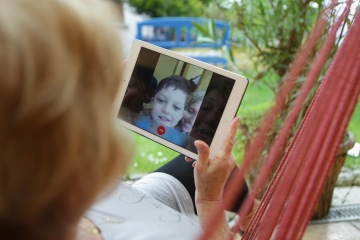3 reasons why telecare & telehealth tools can save the world
November 12, 2020

The second wave of Covid-19 is here. No surprise. Telecare and telehealth tools have been discussed a lot. However, it doesn't seem that elder care businesses managed to adopt the technologies as quickly as many would have expected. Very sad, because I actually think that telecare and telehealth tools can save the world and not just from the pandemic we're fighting right now. Read why.
1. Telecare and telehealth tools can actually help prevent Covid-19 from spreading among caregivers and seniors
In the US States almost 50 % of those who died due to Coronavirus are older than 75 years. It's more than clear that the elderly are the most vulnerable group. For elderly men, the danger is even greater. It's super important to keep our elderly safe. And not just them, but also the people who are taking care of them and stop the coronavirus from spreading among in-home care agencies and senior care facilities.
Age of Coronavirus Deaths
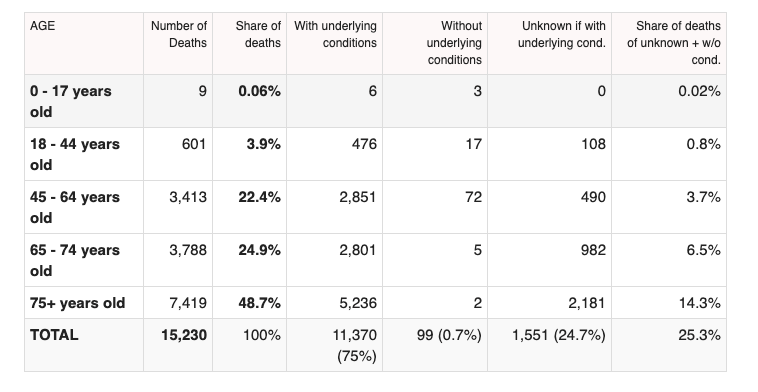
These data provided by New York City Health as of May 13, 2020 include cases in NYC residents and foreign residents treated in NYC facilities. This table shows only confirmed deaths. A death is considered confirmed when the person had a positive COVID-19 laboratory test. Source: Worldometer.info
Telecare tools can help caregivers provide care and support remotely without unnecessary personal visits. Together with the use of telehealth tools they can minimize potentially harmful personal contact with the use of:
- Video teleconferencing and group calls
- Medication management
- Webinars for exercise sessions and lectures
- Integration with wearables and environmental monitors
- One to one and one to many text messaging
- Personal reminders
Minimize personal visits by video chat during Coronavirus outbreak
Professional caregivers
home care agencies, assisted living facilities and other eldercare companies get the Oscar Senior remote care platform for 1 month free of charge – it is ready to be used within 3 days
Family caregivers
download the Oscar Family app in App Store or Google Play to stay in touch with and provide care remotely to your elderly – used to be 7 days free of charge, now it is free for 1 month

2. Telegeriatrics will impact health care and elder care spending
Telehealthcare tools will help us to manage population aging and its consequences. The costs of health care and elder care are already huge considering that
"90% of the nation’s $3.5 trillion in annual health care expenditures are people with chronic health conditions and that 80% of the growing senior population have at least one chronic condition and 77% have at least two." Source: Homecaremag.com
Additionally, in the table below, you can see the monthly cost of senior care in the United States and how it varies across states. It's incredible how costly it is to provide older adults the care and support they need and deserve. The expenditures are actually rising in time and soon we won't be able to provide care to everyone who needs it due to population aging and the growing scarcity of caregivers.
Monthly cost of senior care in the United States
Telegeriatrics is the only cost-effective way to ensure elder care for everyone in the future. Considering that 19% of the time of caregivers is spent traveling and 20% of their visits last up to 15 minutes, there is an opportunity to enable them to be more efficient with telehealth care.
If the caregivers use telecare tools they are able to minimize personal visits to clients and provide more and higher-quality care to the care recipients. For a talk you don't need to travel 2 hours to the client. You can simply start a video call and rather spend those 2 hours by something that actually helps the care recipients.
The video calls with clients allow the caregiver to do a better assessment of the client than just speaking to them over the phone. In an addition, so many elderly have hearing problems and seeing someone's lips move makes it far easier for them to understand someone.
There were 12 care workers per 100 people aged 65 and over in 2015 in the US. So imagine, that 12 caregivers are supposed to take care of 100 older adults. How? Without telegeriatrics it's impossible to provide them the care and support they need.
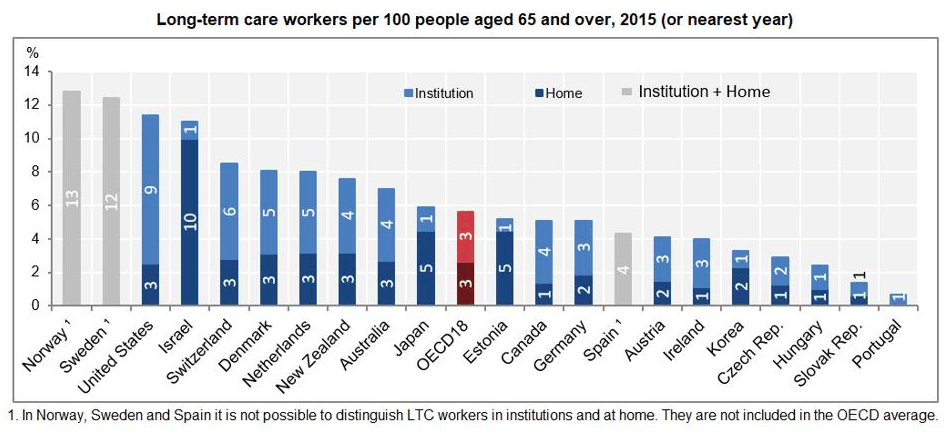
Source: Forbes.com & OECD Health Statistics 2017
And the situation will be even worse.
“The number of Americans ages 65 and older will more than double over the next 40 years, reaching 80 million in 2040. The number of adults ages 85 and older, the group most often needing help with basic personal care, will nearly quadruple between 2000 and 2040.” Source: Urban Institute - Urban.org
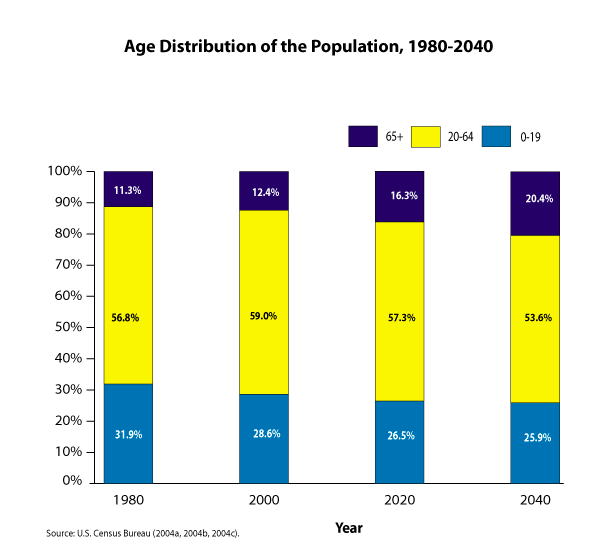
Source: Urban Institute - Urban.org
And well, there are still many family caregivers that are taking care of their elderly but the numbers of family caregivers are decreasing each year. Simply because the life paths of families are changing. Caitlin Gibson in the article for Washington Post states, that America is going around to the idea of having just one child. Plus, children often live far away from their parents, they travel across the state to get a better job etc.
Living distances between parents and children in the United States in 2011
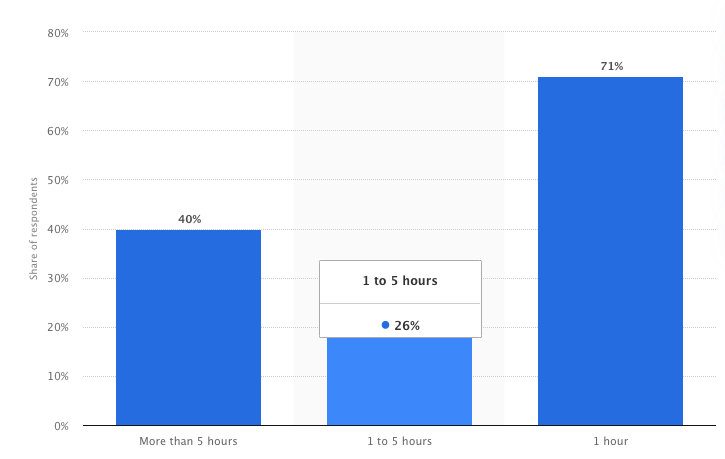
Source: Statista.com
You've probably heard about the sandwich generation – and let me just highlight that sandwich generation is a real thing. Being in the productive age, working, taking care of your adolescent children and taking care of your old parents? That is just too much to handle for anyone.
Find out how telecare can help your business
Schedule a call with Tomas from Oscar Senior. He will go through the troubles you might have in your elder care business and find a way out with use of telecare tools.
3. Telegeriatrics prevent seniors from loneliness and depression
The negative effects of loneliness on the well-being of older adults are undeniable.
“‚The isolation is robbing them of whatever good days they have left — it accelerates the aging process,‘ Joshua Uy, associate professor at the University of Pennsylvania Perelman School of Medicine, said. (...) ‚You see increased falls, decrease in strength and ability to ambulate. You see an acceleration of dementia, because there is no rhythm to your day. There isn’t a single part of a person’s life that isn’t affected.‘” Source: NBCNews.com
By giving seniors access to technology:
- we enable them to maintain their social connections
- we increase their engagement
- train their brains
- and improve their well-being in general.
It is important to prevent older adults from feeling "left out". In the study on video-calls and their ability to reduce loneliness and social isolation within care environments for older people researchers heard this from one of the patients in a care facility:
"that she often sees her children, but would like to have the chance to see her infant great grandchild. She became slightly upset that she still had not seen her great grandchild, and felt left out by her family. She was excited at the thought of being set-up on SoW where she could finally see her family." Source: Research conducted by Zamir, Hnnessy, Taylor and Jones in 2018
In the same research (Zamir, Hnnessy, Taylor and Jones, 2018) it actually came out that one of the biggest burdens to implementing technological tools into elder care might be ageist presumptions of care workers. They tended to think that elderly care recipients wouldn't be even interested in using technology, that they wouldn't be willing to give it a try and learn to work with smart devices.
“‚I don’t want to involve [residents] because of their cognitive impairment they won’t be able to understand what’s going on...I’m not sure how they will react so it’s best to not‘” said one of the care workers in the research conducted by Zamir, Hnnessy, Taylor and Jones in 2018.
Anyways, the seniors later proved them wrong. And our experience at Oscar Senior also showed us that we don't have to fear for the non tech-savvy older adults. They are just fine with using technology once we introduce it to them.
Telegeriatrics bring benefits to all
With Oscar Senior we've had an opportunity to help care businesses implement our remote care platform into their services and we've seen it from a close up. So I'd like to encourage all the care workers, all the owners, founders, CEOs and directors from the care industry that might be reading this to give technology a try. I really believe that you can get more out of it than lose.
When using technology in elder care every participant can actually benefit from it:
- care homes improve their efficiency
- care workers save their time and energy
- seniors feel included and engaged
- family members have a fare greater awareness of the psychological and health status of their loved ones
If you'd like to know how our remote care platform Oscar Senior works and how it can help your elder care business, let us know. We'd be happy to introduce you the many benefits of telecare and its emerging possibilities.
Explore the remote care platform for home care and elder care businesses

Nela Patschova is the Marketing Manager of Oscar Senior and Gerontologist.
She grew up in a multigenerational home and took care of her grand and great-grandparents. These close relationships formed her interest in active aging, ageism and gerontology in general.
She presented her research on two international conferences and published several academic papers and studies. But her life is dedicated to spreading non-stereotypical approach towards people of any age, race or gender.
Keep reading:
The Coronavirus caused a revolution in elder care – what happened?
Our old thinking about how to care for the elderly has changed overnight for the better. COVID -19 has accelerated an emerging trend in the monitoring of older adults - virtual care.
Video calling solutions for tech-challenged seniors
Video chat has reached the masses, it can be used by everyone, no matter their age or technical ability. Let’s take a look at a few video calling options you can try with your senior.
5 tips on taking care of older adults while socially distancing due to coronavirus
Older adults are the most vulnerable group when it comes to disease COVID-19. Elder care companies must act to keep their employees and care recipients safe. Read 5 tips on how to protect the elderly from coronavirus as a caregiver or care provider.



